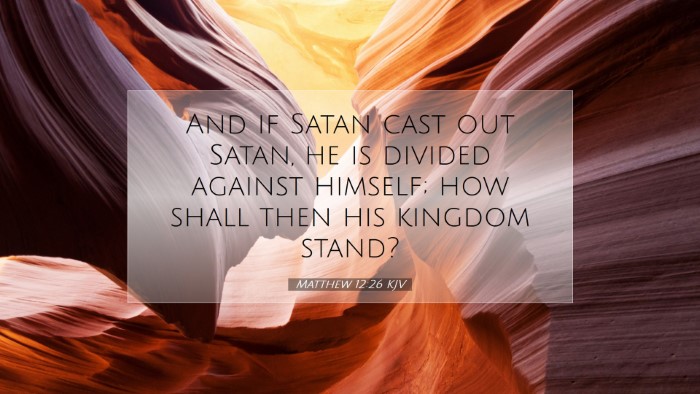Commentary on Matthew 12:26
Bible Verse: "And if Satan casts out Satan, he is divided against himself; how then will his kingdom stand?"
Introduction
This verse occurs during a pivotal moment in Jesus' ministry, as He confronts accusations from the Pharisees regarding the source of His miraculous powers. The argument presented is fundamental to understanding the nature of Christ's authority and the reality of spiritual warfare. In this commentary, we will draw insights from esteemed public domain commentaries to explore the deeper implications of this passage.
Contextual Analysis
Matthew 12:26 is part of a larger discourse wherein Jesus heals a demon-possessed man, restoring his sight and speech. This miraculous act prompts the Pharisees to insinuate that Jesus is operating under the authority of Beelzebul, a ruler of demons. The passage is critical for understanding the dynamics of spiritual authority and the implications of attributing the works of the Holy Spirit to demonic origins.
Key Themes
- Division within the Kingdom: Jesus utilizes a logical argument to highlight the absurdity of the Pharisees' claims. If Satan were to empower Jesus to cast out demons, it would suggest a division within his own kingdom, which, as Jesus points out, would lead to its downfall.
- Nature of Spiritual Authority: The verse emphasizes the clarity of Jesus' mission. His authority originates from God, and He operates in direct opposition to the forces of darkness.
- Recognition of Evil: The mention of Satan invokes the reality of evil in the world. Understanding this is essential for recognizing the source of opposition against Christ and His followers.
Matthew Henry's Insights
Matthew Henry observes that this verse is part of Jesus’ rebuttal against the blasphemy attributed to Him by the Pharisees. He notes that the logic Jesus employs is unassailable; if the adversary begins to work against himself, his defeat is inevitable. Henry highlights the importance of recognizing the work of God in the lives of believers and the necessity of discerning spiritual truth from deception.
He further elaborates that the kingdom of Satan cannot stand if it turns upon itself, reinforcing the idea that unity is vital in both the kingdom of God and in understanding the nature of Christ's mission.
Albert Barnes' Commentary
Albert Barnes emphasizes that the assertion made by the Pharisees conflicts with their own understanding of spiritual warfare. He articulates that the casting out of demons signifies the breaking of Satan’s power, and for Satan to oppose himself is a flawed premise that highlights the irrationality of the Pharisees' accusations.
Barnes further provides a theological perspective, suggesting that this passage reveals the nature of divine authority and the futility of attempts to undermine the work of God. He urges readers to acknowledge the power of Jesus as the decisive force against evil.
Adam Clarke's Exegesis
Adam Clarke offers a detailed analysis of the phrase "if Satan casts out Satan." He points out that this statement illuminates the concept of self-defeat within Satan’s own works. Clarke explains that Jesus aims to clarify that, while demonic powers exist, their destruction is not achieved through self-sabotage but rather through the divine authority of Christ.
Clarke also emphasizes the spiritual implications for believers, encouraging them to align themselves with the power of Christ to claim victory over darkness. He suggests that understanding this truth is crucial for effective ministry and spiritual warfare.
Theological Implications
Theologically, Matthew 12:26 challenges believers to recognize the boundaries of divine and demonic authority. It underscores the necessity of discernment in spiritual matters, reminding Christians of their call to uphold the truth amidst confusion and deception.
Moreover, this passage serves as a reminder of the ultimate authority of Christ over all spiritual realms, empowering believers to engage in spiritual warfare with confidence. The divided kingdom of Satan is a call to unity among believers, encouraging them to stand firm in their faith and the truth of the Gospel.
Conclusion
In conclusion, Matthew 12:26 encapsulates profound truths regarding the identity and mission of Jesus Christ in relation to the forces of evil. The insights from Matthew Henry, Albert Barnes, and Adam Clarke deepen our understanding of the spiritual realities at play and the necessity of recognizing Christ's authority as foundational to our faith and practice. Pastors, students, theologians, and Bible scholars will find in this verse a rich source of reflection on the nature of spiritual conflict and the assurance provided by Christ's sovereign power over all things.


